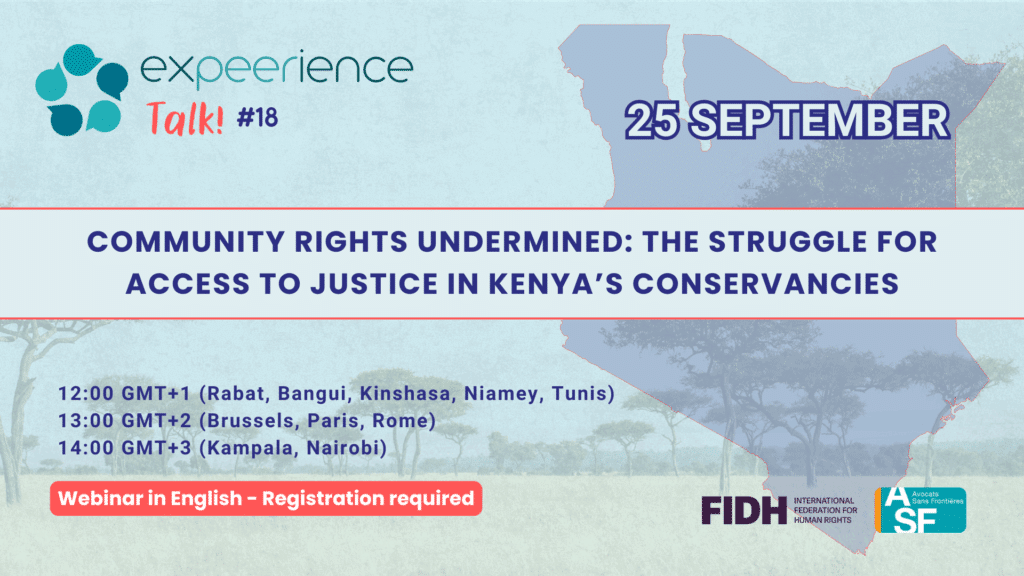
When? Thursday 25 September 2025
Time:
- 12:00 GMT+1 (Bangui, Kinshasa, Rabat, Tunis)
- 13:00 GMT+2 (Brussels, Paris, Rome)
- 14:00 GMT+3 (Nairobi, Kampala)
Language: English
Free webinar – registration required
Community Land, Conservation, and Human Rights Violations in Isiolo County
Justice ExPEERience invites you to its next ExPEERience Talk, moderated by ASF and joined by three expert speakers and a member of one of the communities living within a nature conservancy. This webinar will present the findings of the report “Access to Remedy for Communities Affected by Conservancies in Isiolo”. Carried out in Northern Kenya, this study offers a critical look at the impacts of conservancy projects on local communities and their ability to access justice when their rights are violated.
The report focuses on community conservancies in Isiolo County, areas designated for wildlife conservation, natural resource protection, and carbon credit projects, often advertised as aiming to improve livelihoods. The conservancies, largely supported by the Northern Rangelands Trust (NRT), are then presented as vehicles for community development and environmental protection. However, for many pastoralist communities in Isiolo County, these projects have brought serious human rights concerns, loss of land, and exclusion from decision-making.
The report highlights allegations of human rights violations, including intimidation of human rights defenders, labour rights abuses, and repression of protests, all within a framework that often lacks transparency and accountability. Importantly, a recent court ruling declared some conservancies unconstitutional, recognizing the illegitimacy of land acquisitions and the violation of the principle of Free, Prior and Informed Consent (EPIC) of local populations in the process. This ruling further confirms the limitations illustrated in the report regarding the capacity to seek remedy through existing mechanisms, and their failing regarding accessibility and the communities’ trust in them.
The report also details legal, cultural, and institutional barriers, including a failure to formally register community lands, mistrust in state authorities, patriarchal structures that limit women’s participation, and the perceived capture of public institutions by private conservation interests.
Yet, the report also identifies levers for change. Among the recommendations are calls for stronger oversight of conservancies, legal recognition of community land rights, better protection of local human rights defenders, and the creation of grievance mechanisms that are truly accessible, independent and rights-respecting. The recommendations are framed within the UN Guiding Principles on Business and Human Rights (UNGPs), therefore also illustrating the role of donors and investors that support conservancies in shaping accountability.
On 25 September, Dr. Faith Kabata from Kenyatta University, Joseph Kibugu, Africa Regional Manager at the Business and Human Rights Resource Centre, and Mary Kambo, Programme Manager for the Economic and Social Justice Programme at the Kenya Human Rights Commission will present the results of this research conducted among communities, local leaders, government representatives, and actors from conservation areas, highlighting the shared responsibility among multiple stakeholders.
Objective of the ExPEERience Talk #18
- Present the main findings of the report and explore their legal and human rights implications;
- Analyse the operations of community conservancies in Isiolo in light of international standards, particularly the UNGPs;
- Approach structural and institutional barriers to access to remedy for affected communities;
- Discuss concrete recommendations to improve accountability, justice and sustainable land governance in conservation areas.
Join us on Thursday, 25 September to learn more about this in-depth analysis and the fieldwork carried out in Isiolo County, and participate in a conversation on how to implement more equitable and human rights-based approaches to environmental governance.



